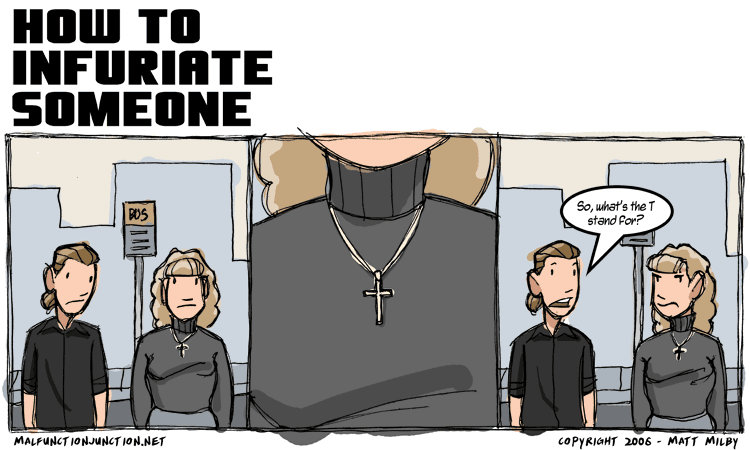You don’t have to ask, she did it for religious reasons.
PONCE DE LEON – When a high school senior told her principal that students were taunting her for being a lesbian, he told her homosexuality is wrong, outed her to her parents and ordered her to stay away from children.
He suspended some of her friends who expressed their outrage by wearing gay pride T-shirts and buttons at Ponce de Leon High School, according to court records. And he asked dozens of students whether they were gay or associated with gay students.
The American Civil Liberties Union successfully sued the district on behalf of a girl who protested against Principal David Davis, and a federal judge reprimanded Davis for conducting a “witch hunt” against gays. Davis was demoted, and school employees must now go through sensitivity training.
And despite all that, many in this conservative Panhandle community still wonder what, exactly, Davis did wrong.
“We are a small, rural district in the Bible Belt with strong Christian beliefs and feel like homosexuality is wrong,” said Steve Griffin, Holmes County’s school superintendent, who keeps a Bible on his desk and framed Scriptures on his office walls.
Holmes County, on the Alabama line, has about 20,000 residents. There is some agriculture, but most people are employed either by prisons or schools; some commute to the Gulf Coast to work in tourism. Ponce de Leon, with fewer than 500 residents, has a cafe, a post office and an antique store.
Many in the community support Davis and feel outsiders are forcing their beliefs on them. Griffin, who kicked Davis out of the principal’s office but allowed him to continue teaching at the school, said high schoolers here aren’t exposed to the same things as kids in Atlanta or Chicago.
“I don’t think we are that different from a lot of districts, at least in the Panhandle, that have beliefs that maybe are different from societal changes,” Griffin said.
Gay rights activists said that’s no excuse for what Davis did.
The problems began last fall when Davis, who did not return phone messages from The Associated Press, admonished the senior, who is identified only as “Jane Doe” in court records and whose friends say she doesn’t want to talk about the experience.
The friends donned gay pride T-shirts and rainbow-colored clothing when they found out how Davis had treated her, and he questioned many of them about their sexuality and association with gay students. Some were suspended.
“Davis embarked on what can only be characterized as a ‘witch hunt’ to identify students who were homosexual and their supporters, further adding fuel to the fire,” U.S. District Judge Richard Smoak recounted in his ruling. “He went so far as to lift the shirts of female students to insure the letters ‘GP’ or the words ‘Gay Pride’ were not written on their bodies.”
Heather Gillman, an 11th-grader who took part in the protests, complained to her mother, Ardena, a 40-year-old corrections officer and mother of three. Ardena Gillman called the ACLU, even though she knew people would be angry.
“I just felt like I had to stand up for the kids. Heather wanted to do this, and I had to back her,” she said.
Ardena hoped to protect the students’ freedom of speech – whether it was the freedom to wear Confederate flag T-shirts to show Southern pride or the freedom to wear rainbow T-shirts to support gay rights.
Courts have repeatedly ruled that similar student protests are constitutional as long as they are not disruptive.
“I think a shirt that says ‘I support gays’ is very different from a shirt that says ‘Gays are going to hell,'” said Benjamin Stevenson, an ACLU attorney. “One can be very disruptive for a child’s self-esteem; the other supports other people and their ideas.”
Ardena Gillman also knew some of the students would need to learn to be tolerant.
“What happens when these kids get out in the real world after they leave Ponce de Leon and they have a black, homosexual supervisor at their job?” she said.
The ACLU sued in January, and Smoak ruled this summer that Davis violated Heather Gillman’s rights.
“I emphasize that Davis’s personal and religious views about homosexuality are not issues in this case. Indeed, Davis’s opinions and views are consistent with the beliefs of many in Holmes County, in Florida, and in the country,” Smoak wrote in an opinion released last month. “Where Davis went wrong was when he endeavored to silence the opinions of his dissenters.”
As Ardena Gillman suspected, the lawsuit created hard feelings in town.
A Wal-Mart worker yelled at her, accusing her of trying to “bankrupt” the school district, which was ordered to pay $325,000 in ACLU attorney fees. One of her friends has refused to talk to her because the lawsuit conflicted with the woman’s religious beliefs.
Others flatly hail Davis as a hero.
“David Davis is a fine man and good principal, and we are a gentle, peaceful, Christian, family-oriented community,” said Bill Griffin, 73 and a lifelong Ponce de Leon resident who is no relation to the district superintendent. “We aren’t out to tar and feather anyone.”
The lawsuit could reflect a division between the high school students who have grown up in an era of gay tolerance and the community’s elders, said Gary Scott, a school board member.
“But I think that’s less of an issue here than in Miami or Minnesota,” he said.
The judge’s scathing rebuke left Scott questioning how his community’s beliefs could be so different from the judge’s opinion.
“I guess I didn’t realize we were this bad,” Scott said.


